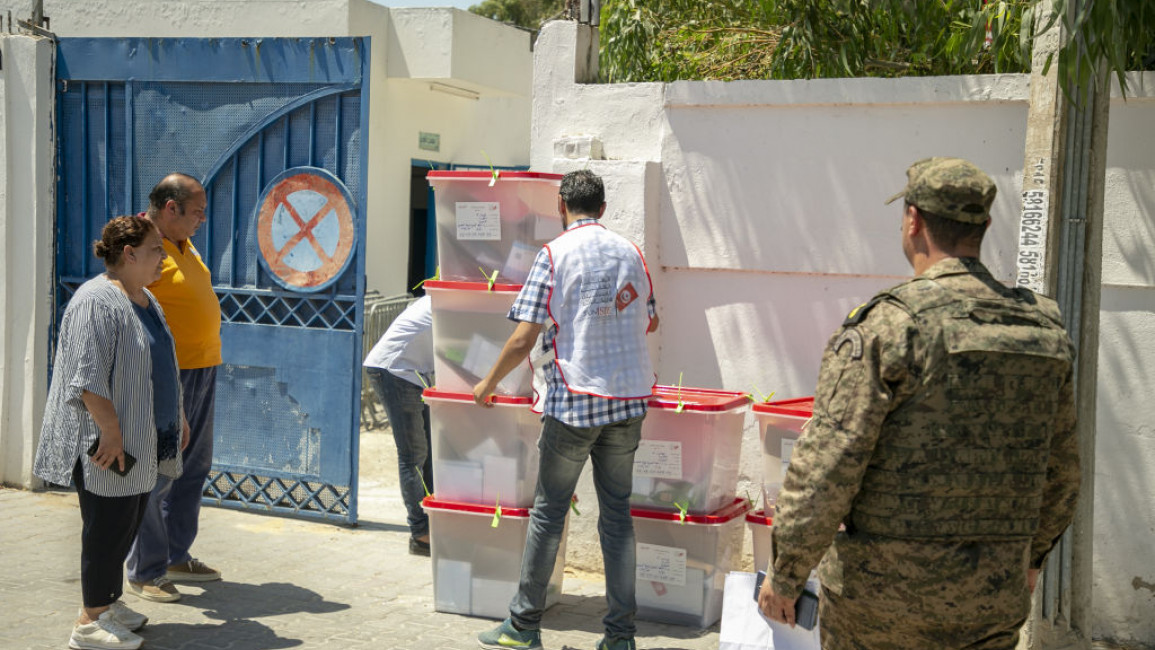Tunisia's draft constitution: What's in the proposed text?
A strengthened presidential system, weakened parliament, religion and rights guarantees all feature in Monday's referendum on Tunisia's constitution, being backed by President Kais Saied who stands to gain the most.
A "yes" vote would bolster the president, giving the head of state far-reaching executive, legislative and judicial powers, and with few checks.
If it passes as expected, it will be a decisive break with the hybrid system enshrined in the 2014 constitution three years after a popular revolt toppled dictator Zine El-Abidine Ben Ali.
Saied published his final draft of the charter just two weeks before Monday's referendum, making minor changes to an original slammed for the nearly unlimited powers it gave his office.
Here are key points from the new draft.
Powerful presidency
The draft would enshrine a highly presidential system, sweeping away limits that the 2014 document had imposed to prevent a return to a Ben Ali-style dictatorship or an autocratic system like that of Habib Bourguiba, the country's first president and independence hero.
The constitution holds no provision for removing the president from office.
The president would appoint a government and could dismiss ministers unilaterally, while unlike in the 2014 text, parliament plays no role in forming an administration.
The executive does not need to pass a confidence vote to take office.
The president could also propose draft laws to parliament, which would be obliged to prioritise them over its own bills.
Diluted parliament
The parliament would be made up of two chambers: the directly elected Assembly of Representatives of the People (ARP) and the Council of Regions and Districts, elected by members of local councils, themselves elected by the public.
To topple a government, a two-thirds majority of both houses would need to pass a no-confidence vote, making it extremely unlikely this would happen.
However, if it were to hold two such votes during a presidential term, the president must either sack the government or dissolve parliament.
The head of state is also responsible for appointing judges, formerly the role of the top independent judicial watchdog the Supreme Judicial Council (CSM) – until Saied replaced the body in February.
Role of Islam, rights guarantees
Two articles have sparked heated debate in Tunisia: one on the role of Islam and another on guarantees of rights and freedoms.
"We live in misery, there hasn't been progress since the revolution."
— The New Arab (@The_NewArab) July 24, 2022
Unpacking Tunisia's draft (and divisive) constitution ahead of the July 25 referendum ⬇ https://t.co/Cq2IiMN9X4
Article 5 of the draft holds that "Tunisia belongs to the Islamic umma [worldwide Muslim community]" and that "it falls to the state alone to work towards the aims of Islam in respect for human life, dignity, property, religion and freedom".
A revised draft Saied published on 8 July adds the phrase "in a democratic system", but secular Tunisians have criticised the formula for its vagueness.
Both the 1959 and 2014 constitutions provided for Islam as the religion of Tunisia, as well as having an article guaranteeing freedom of conscience and religion, which Saied has kept.
The draft's Article 55 held that "the exercise of rights and freedoms may be limited by law or in the name of national defence, public security, public health, the protection of the rights of others or of public morals".
Saied's second draft added that any such restriction on rights must be done within a "democratic framework", but civil society groups have dismissed such guarantees as insufficient – especially given the lack of an independent judiciary.


![President Pezeshkian has denounced Israel's attacks on Lebanon [Getty]](/sites/default/files/styles/image_684x385/public/2173482924.jpeg?h=a5f2f23a&itok=q3evVtko)



 Follow the Middle East's top stories in English at The New Arab on Google News
Follow the Middle East's top stories in English at The New Arab on Google News


